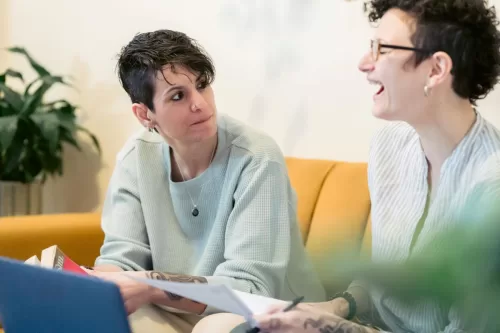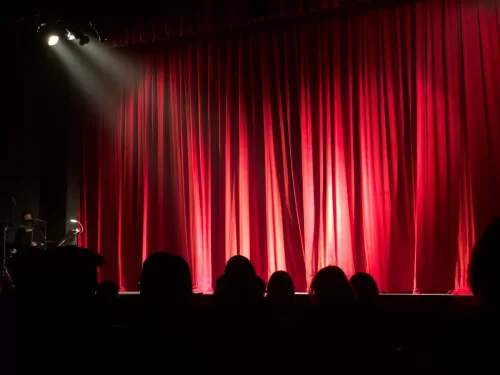Funny or Foul? Opinions Differ on Jokes That Are Offensive
 It’s so easy to offend someone nowadays. People have developed a so-called “thin skin” and often have a tendency to overreact or scream that they are being targeted or that someone is being racist, sexist, or insensitive about others.
It’s so easy to offend someone nowadays. People have developed a so-called “thin skin” and often have a tendency to overreact or scream that they are being targeted or that someone is being racist, sexist, or insensitive about others.
Sometimes it’s true, especially when someone says jokes that are offensive to a targeted group or are generally being mean.
Other times, jokes or humor about a situation aren’t meant to cause emotional hurt. They are just not that funny. So what’s the difference and is there a distinctive line that we should never cross when it comes to jokes about autism or other differences?
Sometimes, it’s not always clear. And whether something is “funny” or “offensive” may vary among cultures, genders, race, religion, political preference, and age (think the “woke” generation). In fact, many comedians complain about this often. They can make a one bad joke and make an entire culture angry. They can also cause emotional hurt, whether purposefully or unwittingly.
Jokes about autism are also very touchy, and while you can argue that no group should ever being the target of jokes that are offensive, it’s more of a grey area to say that nobody should ever make a joke that someone somewhere may not like.
Case in point: people can make a joke about how some individuals are socially awkward or are secretly space aliens in disguise. They may not even be talking about autism directly and not mention the disorder by name, but some people consider the comments being mean.
If someone feels a comment or joke causes emotional hurt and it rubs someone the wrong way, then it can be considered offensive. There are various ways you can handle this.
There’s nothing inherently wrong with some levels of offensive comedy (i.e. going to a comedy show, where most of the material is making fun of aspects of our society, culture, people, and experiences), and it’s something that the audience knows before a show starts.
It’s also a choice as to whether a person wants to pay to go to a comedy show, and an individual can do research beforehand to know more about the comics and the material behind their skits.
Sometimes, abrasive comedy can be the best kind for some individuals. In this case, you don’t need to lose cool over some jokes even if they are bad (and I mean really bad). After all, it’s more than likely that everyone in the audience will be have potential for being offended in some way, and know it’s being done in the spirit of laughs. (You have to decide if that’s for you or not.)
If you choose to be in this situation, and you feel any of the jokes involve being mean for a laugh, you can remember stoicism and how to keep your cool, laugh along with them, how you can make your own comedy with other people with autism, or create your own hilarious jokes that neurotypical people won’t get. Remember, there is typically always a disclaimer that goes along with comedy clubs that any jokes are being made in the spirit of humor and not with malice. Then, the choice to attend is up to you.
Jokes That Are Offensive: Why Being Mean is Never Funny
For those on the autism spectrum, navigating the world of jokes, sarcasm, and humor can often be challenging. While many people tell jokes in a lighthearted way without intent to cause offense, jokes that play on stereotypes about autism or mock autistic traits can cut deeply and promote further stigma.
It’s important to understand that autism spectrum disorder (ASD) is a complex neurological condition that affects people in many different ways. Autism is a wide spectrum, with some individuals requiring very substantial support and others able to live entirely independently. However, all autistic people have differences in communication, social interaction, sensory processing, and behavior when compared to non-autistic people.
Some of the core challenges that come with being on the autism spectrum include difficulties with social cues, restrictive and repetitive behaviors, sensory sensitivities, and struggles with communication and emotional expression. At the same time, many on the spectrum have unique strengths in areas like pattern recognition, attention to detail, and visual skills.
Unfortunately, many jokes about autism tend to mock these real challenges and differences rather than promote understanding. Quips along the lines of “You’re so autistic!” or satirizing repetitive motions, sensory issues like covering ears, or social difficulties like avoiding eye contact make light of legitimate struggles autistic individuals face every day. Autism is a lifelong condition, not a punchline.
These types of jokes can be incredibly hurtful, especially when they come from those who don’t have any lived experience with autism. They dehumanize autistic people and reinforce the notion that their needs, behaviors, and neurological differences are something to be mocked rather than accommodated and destigmatized.
Not All Jokes About Autism Are Insensitive
At the same time, not all autism-related jokes are inherently offensive or insensitive. Many self-advocates and comedians in the autism community have reclaimed the use of humor as a way to build understanding, poke fun at societal misconceptions, and find solidarity and pride with others on the spectrum. Jokes aimed at laughing with the autism community rather than laughing at them can make an impactful statement.
 Some of the more positive jokes about autism deal with characteristics of individuals who are different, and perhaps even quirky, but are driving great change in the world. Like him or not, Elon Musk is a prime example of a successful individual who has told the world he has autism, and jokes about him are typically met with admiration of his accomplishments.
Some of the more positive jokes about autism deal with characteristics of individuals who are different, and perhaps even quirky, but are driving great change in the world. Like him or not, Elon Musk is a prime example of a successful individual who has told the world he has autism, and jokes about him are typically met with admiration of his accomplishments.
Self-deprecating humor from those with lived experience with autism can help increase awareness and even make some feel more comfortable discussing differences and challenges openly. This type of humor comes from an authentic place of familiarity with the autistic experience. It highlights real struggles people face but with a sense of acceptance and empowerment rather than meanness or malice.
For example, an autistic comedian might make a self-referential joke about a special interest (the deep obsessive interests common in autism) to share some insight into the autistic mind while also leaning into the humor of it from their own perspective. Or an autistic writer might make a quip about stimming (repetitive body motions like hand flapping) while uplifting the importance of accepting harmless stims. (Remember, almost everyone stims in some way.)
RELATED: Exploring Myths and Realities of High Functioning Autism Symptoms
Handling Jokes About Autism and Avoiding Emotional Hurt
So how can autistic individuals handle jokes and attempted humor about autism, whether from a well-meaning friend, an insensitive comedian, or off-hand teasing? Here are some tips:
- Speak up if you are hurt or offended by a joke. Have the confidence to calmly explain why the joke promotes hurtful stereotypes or makes light of genuine challenges you face. Don’t be afraid to educate.
- Don’t feel obligated to laugh or engage if a joke makes you uncomfortable or crosses a line. You can politely refuse to encourage the behavior.
- If the situation is inappropriate or with someone unwilling to listen, remove yourself from it. Your peace of mind is most important.
- Use self-deprecating humor focused on your own experiences to increase understanding and show there is nothing to be ashamed of. Well-placed jokes can be cathartic.
- Support comedians, actors, writers, and other public figures on the autism spectrum whose jokes and humor come from an authentic place of lived experience rather than mockery.
- Look for allies who avoid jokes that mock or stigmatize autism and who are open to learning why certain humor can be hurtful even if unintentionally offensive.
- Consider finding an autism support group where you can feel comfortable being yourself and bantering with others who share your neurodivergent experiences.
The goal isn’t to get overly worked up about every autism joke or to become completely humor-avoidant. Many jokes are told without true ill intent or being mean, even if they are insensitive or show a lack of understanding. Maintaining perspective is important. But increased awareness, open dialogue, and having representatives with authentic autistic voices can lead to more thoughtful, compassionate, and informed humor that brings people together rather than dividing them.
For neurotypical comedians, writers, and others looking to incorporate autism-related jokes or humor into their material, educating yourself on the autistic experience is crucial to avoid demeaning or punching down at an already marginalized group. Consider bringing in autistic collaborators for perspective. Make it clear when humor is told from the autistic point of view versus when neurotypical assumptions are being reinforced.
RELATED: How to Talk Respectfully to Individuals on the Spectrum
Being Mean Isn’t Required: Comedy Can Be Uplifting As Well
 Additionally, focus on uplifting voices from the autism community already doing amazing work in sharing amusing yet enlightening takes on autistic life. Amplifying these artists and listening humbly can make comedy more inclusive while still finding the humor in human experiences we all share, autistic and non-autistic alike.
Additionally, focus on uplifting voices from the autism community already doing amazing work in sharing amusing yet enlightening takes on autistic life. Amplifying these artists and listening humbly can make comedy more inclusive while still finding the humor in human experiences we all share, autistic and non-autistic alike.
As with many underrepresented and misunderstood groups, the autism community is not looking for autism to be off-limits for humor entirely. But working together to dismantle harmful stereotypes through thoughtfulness, empathy, and ensuring autistic people have a voice in crafting humorous autistic narratives is paramount.
As the conversation around autism representation in comedy and media progresses, it’s also important to recognize the diversity within the autism community itself. Just as there is no single way to “be autistic,” there is a wide range of viewpoints and preferences when it comes to autism-related humor.
Some autistic individuals are very open to self-deprecating jokes and finding the inherent humor in their own idiosyncrasies related to autism. For them, this allows a reclaiming of the autistic identity and embracing neurodivergence with pride. Comedy can be cathartic and empowering when it comes from a place of lived experience.
Others, however, may find it extremely uncomfortable or even damaging to make light of autistic traits, even within the community. Everybody has their own boundaries and thresholds of emotional hurt when it comes to mocking oneself or having one’s identity be the subject of humor. These viewpoints are equally valid.
Avoiding Emotional Hurt From Jokes That Are Offensive
The autistic rights movement is still relatively young, and there are robust ongoing debates around identity, language, and representation. While many autistic self-advocates have embraced identity-first language like “autistic person,” others still prefer the person-first phrase “person with autism.” Some refer to themselves as “Aspies,” although the diagnosis of Asperger’s Syndrome has now been rolled into the overall fold of autism spectrum disorder.
The motto “nothing about us, without us” encapsulates the importance of prioritizing authentic autistic narratives and having a seat at every table where stories about autism are being shaped.
When it comes to comedy specifically, some feel all autism jokes, even those told by autistic comedians about themselves, run the risk of perpetuating stigma. The concern is that the tendency for neurotypicals to miss nuance and broad stereotypes will be reinforced rather than dismantled. These self-advocates would prefer autistic identity be depicted matter-of-factly, without any hint of mockery.
On the flip side, others believe humor is a powerful tool for increasing acceptance and creating inroads for greater understanding around autism. If autistic comedians and creators are taking the lead with their comedy, jokes allow for examining eccentricities through a loving and deeply personal lens. Done well, autism comedy can reframe perspectives and make the unfamiliar feel familiar to neurotypical audiences.
Additionally, many in the autism community have embraced and reclaimed a vibrant “auterrific” culture replete with in jokes, humor, and easter eggs meaningful to them. Stimming toys with fun designs, enamel pins celebrating special interests, and apparel empoweringly declaring “Awesomistic” or other cheeky autism-centric sayings are examples of how the community has organically cultivated joy and pride around autistic identity.
For creators outside the autism community, the key is to avoid exploitation or mockery, and ensure uplifting and accurate autism narratives by including autistic collaborators. Merely depicting autism as a supernatural gift or savant ability also misses the nuance of real autistic experiences and humanity.
If jokes about autism are to be incorporated, it’s best when handled through an intimately autistic lens or developed in deep consultation with the community to avoid perpetuating harmful stereotypes and ensure authentic representation. Simply put, autism shouldn’t be the punchline itself, but rather a facet of the human experience from which to explore intelligent and thoughtful humor.
Ultimately, there is space for nuanced comedy around autism, as long as it creates more inclusion rather than division. But autistic individuals must have agency over their own narratives and be the ones guiding how humor portrays their identity, struggles, quirks and humanity. The responsibility is on all creators to listen, collaborate and avoid stigma.
RELATED: Think Before You Speak – 15 Autism Insensitivity Comments to Avoid
Laughter is Universal: Avoiding Emotional Hurt
As long as the central goal is uplifting and destigmatizing, the autism community can certainly embrace the comedy uniting all of humanity’s rich diversity of experiences, perspectives and methods of expression. After all, laughter is universal – it just must come from an authentic place of mutual understanding and acceptance.
As the autism community continues to grow in visibility and advocate for more understanding, we are seeing an increasing number of autistic writers, comedians, actors and public figures embracing and destigmatizing autism through their art and humor.
 For example, Hannah Gadsby’s comedy special, “Douglas,” featured a poignant segment about her autism diagnosis as an adult. She reclaimed the rhetoric around autism, joking about missing social cues and taking things too literally, but in a way that felt uplifting and relatable rather than mocking.
For example, Hannah Gadsby’s comedy special, “Douglas,” featured a poignant segment about her autism diagnosis as an adult. She reclaimed the rhetoric around autism, joking about missing social cues and taking things too literally, but in a way that felt uplifting and relatable rather than mocking.
Comedian Michael McCreary, who is on the spectrum, integrates his experiences into his stand-up routines, creating laughs from his unique perspective while educating audiences. “I’ve gotten to the point in my act where I can go into my autistic nature and experiences and just let it rip,” he said in an interview.
Highlighting the isolation and social difficulties autistic people often face, but with humor and vulnerability, allows these comedians to galvanize both autistic and neurotypical audiences. Their jokes make space for nuanced discussion and don’t diminish or belittle autism as the stereotypical “punchline.”
In television and film, we’re also seeing more authentic autistic narratives brought to life, rather than harmful caricatures. The hit Sundance film, Please Baby Please, cast several autistic actors and based its story on the lived experiences of the autistic co-writers.
And series like “Everything’s Gonna Be Okay” have been praised for their heartfelt and honest autistic representation, with autistic writers and actors involved. By putting thoughtful care into portraying autistic perspectives with nuance, these more recent projects open the door for more understanding through humor and humanity.
It’s an important shift away from past negative stereotyping of autistic people as emotionless or strange oddities that lack empathy. In reality, many autistic people simply have different methods of expressing emotion or connecting with others that are just as valid.
As these authentic autistic voices continue gaining platforms in comedy and entertainment, the hope is that neurotypical audiences will be encouraged to see past broad autism stereotypes. The humor comes not from punching down at autistic people, but rather uplifting the shared aspects of the human experience that unite all of us.
At the same time, it’s okay if some autistic people prefer to steer clear of most autism-related comedy or humor for self-preservation. Everyone has different sensitivities and comfort levels with joking about heavy subject matter that impacts their lived reality so directly.
RELATED: Thinking Differently – Why Having Brains on Fire Sparks Innovation
Avoiding Emotional Hurt By Prioritizing Well-Being
If you’re not in an emotional space to engage with certain jokes or media, prioritize your own wellbeing. Take breaks as needed from autism narratives shaped by a neurotypical lens. Seek out affirmation and humor specifically from autistic creators whose work resonates with your experiences.
For those interested in exploring autism-related humor with more care, connecting with the autistic community can be incredibly rewarding. Follow self-advocates and creatives on the spectrum who are uplifting one another’s voices and talents while using humor to destigmatize.
There is power in reclaiming autistic identity through art, joy, and seeing the humor in the shared struggles and quirks that make autistic people unique. Just remember to approach with empathy – the same understanding and accommodation you’d want extended toward your own emotions, sensitivities and journey.
Ultimately, the most impactful autism narratives will be the ones shaped boldly by authentic autistic perspectives. If neurotypical comedians and creatives choose to incorporate autism themes, they must do so responsibly while amplifying, not speaking over, the autistic community.
With more thoughtful collaboration and representation, we can absolutely increase acceptance and find more inclusive ways to laugh together across neurotypes. Humor has the power to unite when it’s rooted in truth and human connection, and not by being mean.
For autistic people who may struggle with social cues and figures of speech like sarcasm, being the target of jokes about their neurological differences can be confusing and create anxiety in addition to emotional hurt. By speaking up about boundaries and humanizing the autistic experience, hopefully more thoughtful windows for humor can be opened up without demeaning or excluding anyone with jokes that are offensive.
Uplifting jokes about autism detailing special interests like trains or octopuses told by a comedian on the spectrum are more likely to be received as charming than yet another stale joke equating autistic behavior to being a robot. It’s time to retire jokes about autistic people “not having any emotions” once and for all. (By the way, we do. We just express them differently.)
With more visibility and acceptance, both the autism community and society at large can move past mockery to embrace all the wonderful complexities, insights, and yes, sometimes amusingly peculiar or quirky perspectives, which come with being autistic. Laughter is universal, but it need not be at the expense of others anymore.
RELATED: Shedding Light on Autism and Why It’s An Invisible Disability
Autism in Adults: Living, Learning, and Overcoming Challenges for a Fulfilled Life
Autism in adults requires additional support and coping skills to achieve independence in today’s world.
Learn more about ways adults can live fulfilled lives and the challenges they face.
- 14 Practical Ways for Staying Motivated to Unlock Full Potential
- Autism and Independence: 7 Skills That Empower Individuals to Thrive
- Dangers of Social Media Addiction: How To Leave the Screens And Face the Real World
- Autism Volunteer Opportunities: 5 Ways Helping Others Fosters Acceptance
- 8 Heartfelt Ways Autism Emotional Support Animals Transform Lives
- Top 25 Hurdles Individuals Face Daily on the Spectrum
- Are You An Adult With Autism? Here Are 6 Signs
- Autism After High School: Is College the Next Step?
- Autism vs Asperger’s Syndrome: What You Need to Know
- Autism Disclosure: Is Revealing Your Disorder Helpful or Hurtful?
- Work and Autism: What Employers Should Know About Hiring People with Neurodiversity
- Drivers with Autism Can Achieve Success Behind the Wheel